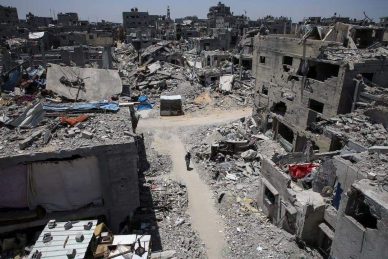GAZA, (PIC)
The water crisis in Gaza continues as the Israeli occupation army insists on closing all crossings and targeting water sources as a deadly weapon to tighten the siege on Gaza’s residents in an ongoing genocide that has lasted eight months, right before the world’s eyes.
Displaced people in Gaza are forced to stand in very long queues hoping to get a little clean drinking water, increasing the suffering, especially for children, the elderly, and women. Children and adults alike carry their empty containers and walk long distances, risking being bombed and killed in their search for a drink to quench their thirst and stay alive amid continuous aggression and blockade.
Midway through this month, the Gaza municipality revealed the extent of the water crisis, detailing the actions of the Israeli army against this vital sector, which threatens all aspects of life in Gaza. The municipality reported severe damage to the water tank in the Tel al-Hawa area due to Israeli bombing on Sunday evening (19/5/2024).
The municipality confirmed that the bombing has caused extensive and significant damage to water facilities since the beginning of the aggression and genocide, with about 40 wells damaged to varying degrees and 42,000 meters of water networks affected. The city suffers from a severe shortage of water due to a lack of fuel and power outages needed to operate the wells.
In this context, Palestinians in Gaza face a severe water crisis that worsened after the Israeli army invaded Rafah, escalating their humanitarian suffering amid harsh living conditions and high temperatures. Displaced people, including children and the elderly, are forced to carry jugs and pull small carts over long distances to get water. Thousands of women have resorted to using seawater for their daily needs.
Hundreds of thousands of forcibly displaced people from Rafah have set up tents in areas such as northwest Rafah, the devastated city of Khan Yunis, and the central Gaza Strip coast, only to find themselves facing a severe water crisis due to the destruction of more than 70% of the infrastructure in a region home to 2.3 million people.
Najwa Mohammed, a displaced person experiencing forced displacement for the sixth time, says, “Today, I can no longer buy water or get it from distant places, so I rely on seawater to wash clothes and cooking utensils.” The fifty-year-old explains, “Since the Jews displaced us from Gaza, the water crisis has never ended. Even when we moved to Khan Yunis before the Jews invaded it, we struggled to get water, and it was the same in Rafah,” according to the SANAD Agency.
She adds, “After the Jews displaced us from Rafah, we found no place but the seashore, where water is scarce, and there are many people. We buy a gallon of desalinated water for four shekels (about 3.7 dollars), and sometimes international organizations distribute water for free, but it is not enough for everyone due to the overcrowding of displaced people.”
According to the latest figures from the United Nations Relief and Works Agency (UNRWA), about 810,000 Palestinians have been forcibly displaced from Rafah in the past two weeks.
Decline in per capita water share
Due to the Israeli aggression, the water allocation per person in Gaza has decreased by 97%, according to a joint report by the Palestinian Central Bureau of Statistics and the Palestinian Water Authority on World Water Day at the end of March. The report stated that the war on the sector has led to a drop in individual water consumption in Gaza to between 3 and 15 liters per day, compared to an average consumption of about 84.6 liters per person per day in 2022.
The total amount of water currently available in Gaza is estimated to be about 10 to 20% of the total available before the aggression, with this quantity being unstable and dependent on fuel availability. Gaza primarily relies on water extracted from underground sources.
Israel turns water into a weapon of mass destruction
At the beginning of this year, the magazine “972+” reported that since the start of the war, Israel has created an unprecedented health crisis by depriving Palestinians in Gaza of drinkable water, threatening to cause irreparable environmental damage by using water as a weapon in its current attack on Gaza. The magazine highlighted a warning from UN Special Rapporteur Pedro Arrojo-Agudo that Israel “must stop using water as a weapon of war,” noting that the death toll from water shortages could exceed that from Israeli bombing.
The magazine asserted that depriving Gaza of water, described as a weapon of mass destruction, has been a key tactic in the war since the beginning. Israel closed the pipelines feeding the Strip on October 7, 2023, with war minister Yoav Gallant declaring, “Israel imposed a complete blockade on Gaza: no electricity, no food, no water, no fuel. Everything is closed. We are fighting human animals, and we act accordingly.”














